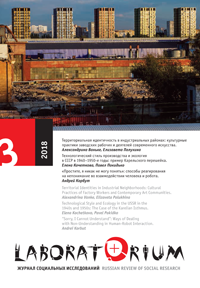From Socialist Realism to Orthodox Christianity: “Blockade Temples” in Saint Petersburg
From Socialist Realism to Orthodox Christianity: “Blockade Temples” in Saint Petersburg
Author(s): Tatiana VoroninaSubject(s): Cultural history, Architecture, Military history, Evaluation research, Rural and urban sociology, Eastern Orthodoxy
Published by: Центр независимых социологических исследований (ЦНСИ)
Keywords: Historical Memory; Siege of Leningrad; Architecture; Monuments; Commemoration; Russian Orthodox Church; Associations of the Siege Survivors;
Summary/Abstract: the Siege of Leningrad in Saint Petersburg, investigates the processes of formation and transformation of historical memory of this event in the urban space. The secular language of the artistic representation of the blockade created during the years of the USSR was instrumentalized by agents of the politics of history on the eve of perestroika and reinterpreted through the categories of Orthodox Christianity in contemporary Russia. Following the cultural transformations that took place during perestroika, I identify new actors of the politics of history: organizations of blockade survivors, Russian nationalists, and the Russian Orthodox Church. They were the driving force behind many memorials and commemorative signs dedicated to the Blockade of Leningrad in and around Saint Petersburg in the 1990s and early 2000s. The construction of Russian Orthodox churches dedicated to the memory of the blockade, like the Church of the Assumption of the Blessed Virgin Mary on Malaia Okhta and the Church of All Saints Resplendent in the Russian Land in Victory Park, testify to the emergence of a new language of historical commemoration in the post-Soviet Saint Petersburg. It also indicates the inclusion of the blockade in the category of events significant to the historical narrative of the Russian Orthodox Church. Using the example of the Russian Orthodox Church’s policy regarding commemoration of the blockade in the 1990s, I outline the reasons why a formerly marginal agent of the politics of history not only was able to mark its presence in the city’s cultural space, but also began to claim the place of the most influential interpreter of the past in contemporary Russia.
Journal: Laboratorium. Журнал социальных исследований
- Issue Year: 10/2018
- Issue No: 3
- Page Range: 79-105
- Page Count: 27
- Language: English

